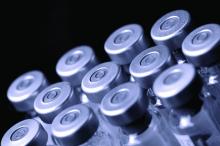and it demonstrated adequate immune response to MenB, according to Marco Aurelio P. Safadi, MD, of Santa Casa de São Paulo (Brazil) School of Medical Sciences, and his associates.
Of 117 healthy infants who received 4CMenB concomitantly with MenC CRM and 111 who received MenC CRM alone, 99%-100% of infants had serum bactericidal antibody assay using human complement (hSBA) titres 1:8 or greater against MenC after the second vaccination of the primary series (3 months, 5 months, and 12 months of age), and 100% of infants reached these titres after the booster vaccination.
There was a good immune response against MenB test strains, with 95%-97% of infants having hSBA titres of 1:4 or more after completing the primary series; it rose to 97%-100% after the booster dose, the researchers reported.There were more local reactions, such as tenderness, with the combination MenB and MenC vaccinations than with the MenC vaccine alone, as well as systemic adverse reactions such as unusual crying and fever.
However, there were no “concerning safety signals identified,” wrote Dr. Safadi and his colleagues. “Although this was only a small study ... the results have paramount importance for public health vaccination policies in countries such as Brazil, where a significant burden of disease is caused by these two major disease-causing serogroups in infants and small children.”Read more in the journal Vaccine (2017 Apr 11;35[16]:2052-9).



